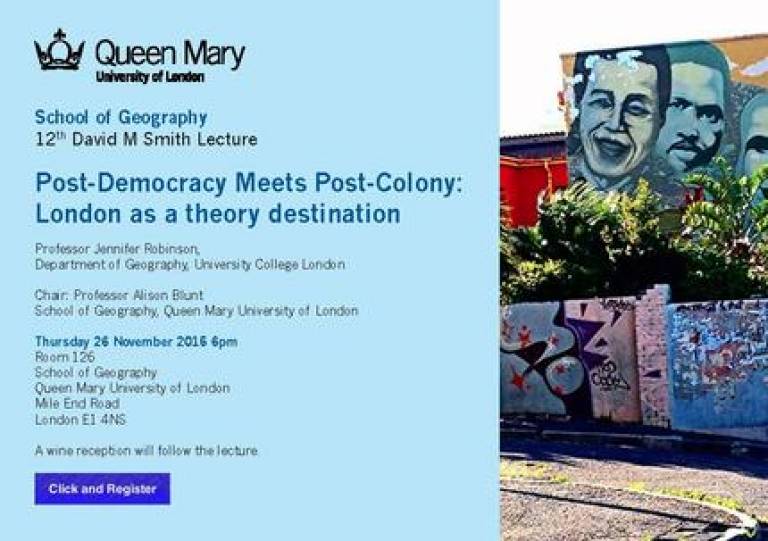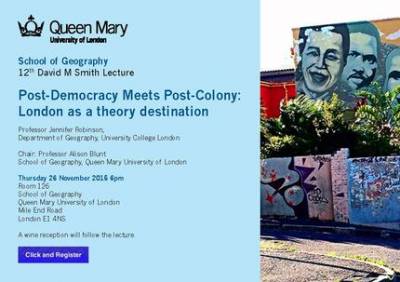Post-Democracy Meets Post-Colony: London as a theory destination
26 November 2015, 6:00 pm

Event Information
Open to
- All
Location
-
Room 126, School of Geography, Queen Mary University of London, Mile End Road, London E1 4NS
As urban studies responds to shifting trends in global urbanisation, a much wider range of urban experience is informing understandings of urban processes. This lecture will consider how innovations in the practice of comparative analysis can support such an expansion in the horizon of conceptualisation.
Putting this into practice by thinking across London and cities in Africa is inspired by David Smith's commitment to international research, including his strong interest in South Africa, and the ambition to combat injustice which his work embodied. The analysis of urban politics in South Africa and in other African contexts offers a rich repertoire of theoretical insight, stretching from governance and policy formulation in the post-apartheid era, to revolutionary urban social movements as well as a fine infrastructure of mobilisation, engagement, contestation, collaboration, evasion and invention which marks out a prosaic but significant arena of ongoing urban transformation.
This lecture will confront the relative pessimism
of post-democratic and post-political analyses of urban governance and
contestation in London with views from post-colonies, where
democratisation and hopes of transformation have figured so strongly in
shaping dynamic forms of emergent political association - but where
these have also very often become hollow signifiers of spectral and
peremptory forms of power. What can the post-colony bring to the
analysis of post-democracy? The lecture will focus on some key elements
of the architecture of urban governance in both contexts, including
strategic visioning, large scale developments, and popular mobilisation.
This kind of experiment in comparative thinking takes seriously the
potential of a strong post-colonial commitment to decentring
theorisation, provoking a more global urban theory, and making London a
destination for theory.
Jennifer Robinson is Professor of Human Geography at UCL, Co-Director of the UCL Urban Laboratory and Visiting Professor at the African Centre for Cities, University of Cape Town. She has also worked at the University of KwaZulu-Natal, Durban, the LSE (London) and the Open University. Her book, Ordinary Cities (Routledge, 2006) developed a post-colonial critique of urban studies, arguing for urban theorising which draws on the experiences of a wider range of cities around the globe. This project has been taken forward in her call to reinvent comparative urbanism for global urban studies in her recent, Cities in a world of cities article in the International Journal of Urban and Regional Research, and Thinking Cities through Elsewhere, in Progress in Human Geography. Current projects include exploring transnational aspects of Johannesburg and London's policy making processes and collaborative and community-based research comparing governance of large scale urban developments in London, Johannesburg and Shanghai (with Phil Harrison and Fulong Wu). She has also published extensively on the history and contemporary politics of South African cities, including The Power of Apartheid (Butterworth-Heinemann, 1996).
Links
 Close
Close


